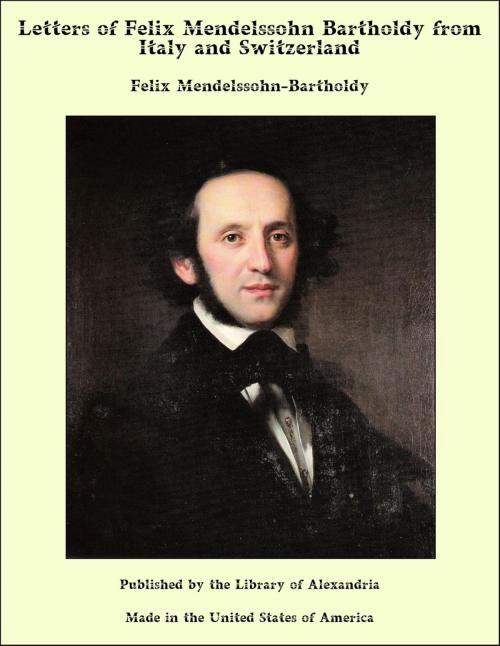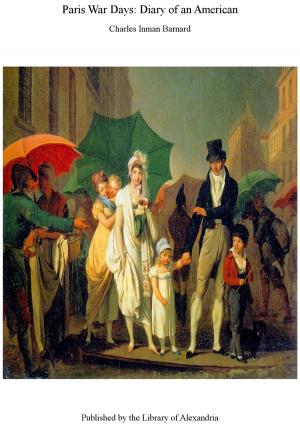Letters of Felix Mendelssohn Bartholdy from Italy and Switzerland
Nonfiction, Religion & Spirituality, New Age, History, Fiction & Literature| Author: | Felix Mendelssohn-Bartholdy | ISBN: | 9781465605498 |
| Publisher: | Library of Alexandria | Publication: | March 8, 2015 |
| Imprint: | Language: | English |
| Author: | Felix Mendelssohn-Bartholdy |
| ISBN: | 9781465605498 |
| Publisher: | Library of Alexandria |
| Publication: | March 8, 2015 |
| Imprint: | |
| Language: | English |
Felix Mendelssohn Bartholdy was born at Hamburg, on the third of February, 1809. The name to which he was destined to add such lustre, was already high in the annals of fame. Moses Mendelssohn, his grandfather, a great Jewish philosopher, one of the most remarkable men of his time, was the author of profound Metaphysical works, written both in German and Hebrew. To this great power of intellect, Moses Mendelssohn added a purity and dignity of character worthy of the old stoics. The epigraph on the bust of this ancestor of the composer, shows the esteem in which he was held by his contemporaries: "Faithful to the religion of his fathers, as wise as Socrates, like Socrates teaching the immortality of the soul, and like Socrates leaving a name that is immortal." One of Moses Mendelssohn's daughters married Frederick Schlegel, and swerving from the religion in which both had been brought up, both became Roman Catholics. Joseph Mendelssohn, the eldest son of this great old man, was also distinguished for his literary taste, and has left two excellent works of very different characters, one on Dante, the other on the system of a paper currency. In conjunction with his brother, Abraham, he founded the banking-house of Mendelssohn — Company at Berlin, still flourishing under the management of the sons of the original founders, the brothers and cousins of Felix, the subject of this memoir. George Mendelssohn the son of Joseph, was also a distinguished political writer and Professor in the University at Bonn. With such an array of intellectual ancestry, the Mendelssohn of our day came into the world at Hamburg, on the third of February,1809. He was named Felix, and a more appropriate name could not have been found for him, for in character, circumstance and endowment, he was supremely happy. Goethe, speaking of him, said "the boy was born on a lucky day." His first piece of good fortune, was in having not only an excellent virtuous woman for his mother, but a woman who, besides these qualities, possessed extraordinary intellect and had received an education that fitted her to be the mother of children endowed as hers were. She professed the Lutheran creed, in which her children were brought up. Being of a distinguished commercial family and an heiress, her husband added her name of Bartholdy to his own. Mme. Mendelssohn Bartholdy's other children were, Fanny her first-born, whose life is entirely interwoven with that of her brother Felix, and Paul and Rebecca, born some years later.
Felix Mendelssohn Bartholdy was born at Hamburg, on the third of February, 1809. The name to which he was destined to add such lustre, was already high in the annals of fame. Moses Mendelssohn, his grandfather, a great Jewish philosopher, one of the most remarkable men of his time, was the author of profound Metaphysical works, written both in German and Hebrew. To this great power of intellect, Moses Mendelssohn added a purity and dignity of character worthy of the old stoics. The epigraph on the bust of this ancestor of the composer, shows the esteem in which he was held by his contemporaries: "Faithful to the religion of his fathers, as wise as Socrates, like Socrates teaching the immortality of the soul, and like Socrates leaving a name that is immortal." One of Moses Mendelssohn's daughters married Frederick Schlegel, and swerving from the religion in which both had been brought up, both became Roman Catholics. Joseph Mendelssohn, the eldest son of this great old man, was also distinguished for his literary taste, and has left two excellent works of very different characters, one on Dante, the other on the system of a paper currency. In conjunction with his brother, Abraham, he founded the banking-house of Mendelssohn — Company at Berlin, still flourishing under the management of the sons of the original founders, the brothers and cousins of Felix, the subject of this memoir. George Mendelssohn the son of Joseph, was also a distinguished political writer and Professor in the University at Bonn. With such an array of intellectual ancestry, the Mendelssohn of our day came into the world at Hamburg, on the third of February,1809. He was named Felix, and a more appropriate name could not have been found for him, for in character, circumstance and endowment, he was supremely happy. Goethe, speaking of him, said "the boy was born on a lucky day." His first piece of good fortune, was in having not only an excellent virtuous woman for his mother, but a woman who, besides these qualities, possessed extraordinary intellect and had received an education that fitted her to be the mother of children endowed as hers were. She professed the Lutheran creed, in which her children were brought up. Being of a distinguished commercial family and an heiress, her husband added her name of Bartholdy to his own. Mme. Mendelssohn Bartholdy's other children were, Fanny her first-born, whose life is entirely interwoven with that of her brother Felix, and Paul and Rebecca, born some years later.















